10 Questions for Screenwriter Sarah Phelps | reviews, news & interviews
10 Questions for Screenwriter Sarah Phelps
10 Questions for Screenwriter Sarah Phelps
Stage and TV veteran turns to the experiences of nurses on the Western Front in 'The Crimson Field'
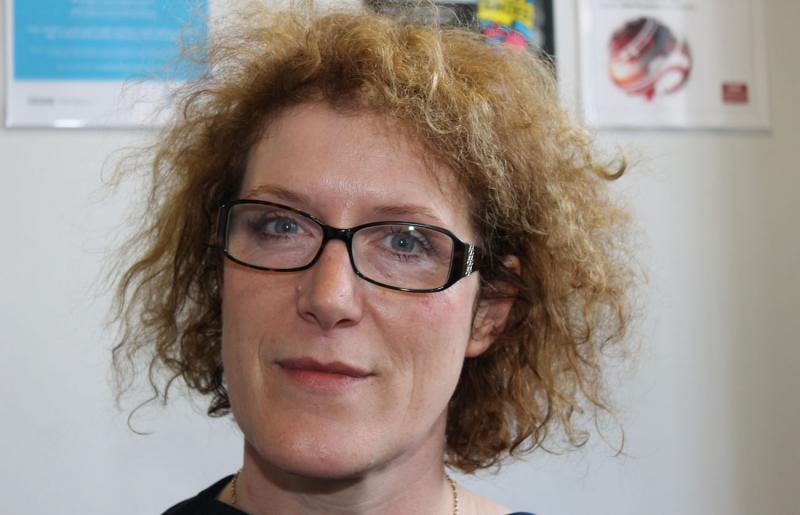
In a hectic writing career spanning theatre, radio, film and TV, Sarah Phelps can lay claim to such milestone moments of popular culture as both the return of Den Watts to EastEnders and his subsequent demise in 2005, and writing the screenplay for BBC One's adaptation of Dickens's Great Expectations at Christmas 2011, which starred Ray Winstone and Gillian Anderson.
But right now we're concerned with her new World War One nursing drama, The Crimson Field, which debuts on BBC One on Sunday. Boasting a thunderous girl-power lineup which includes Hermione Norris, Suranne Jones, Kerry Fox and Oona Chaplin, it's set in a Voluntary Aid Detachment field hospital in France in June 1915, at a relatively early point in the war when the participants were still trying to grasp the enormity of what had been unleashed across the European continent. "There was a feeling of unease at home because of the casualty lists and the injuries that people were seeing," says Phelps, who talks with a freewheeling urgency about a subject she has taken obsessively to heart. "There was a feeling of 'God, what have we got ourselves into here? It can't be right.' Because this wasn't a clean war." Through the stories of the various nurses, the military top brass and the maimed and traumatised soldiers passing through the hospital, Phelps has set out to shed some revealing light on events which still reverberate around us today (Hermione Norris as Matron Grace Carter, pictured below).
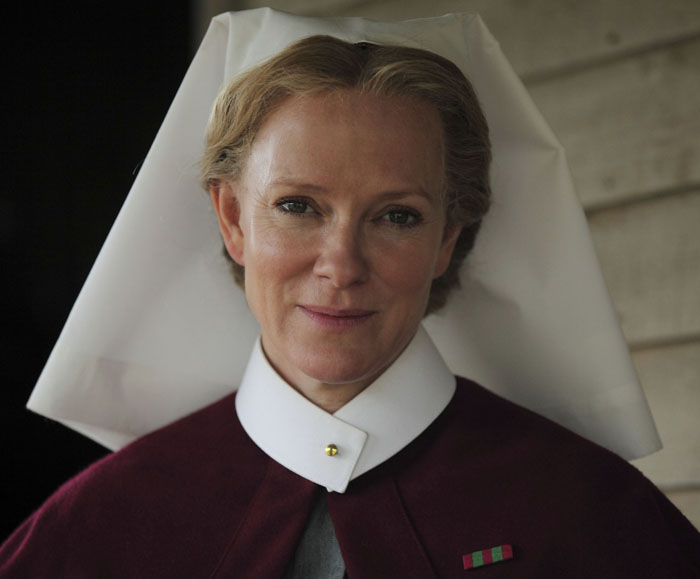 ADAM SWEETING: Did The Crimson Field come about solely because of the World War One centenary?
ADAM SWEETING: Did The Crimson Field come about solely because of the World War One centenary?
SARAH PHELPS: The project was because the BBC wanted to mark the centenary, but I feel there's something about the First World War that has been part and parcel of my life. My parents were huge devoted fans of Joan Littlewood's Oh, What a Lovely War! My dad was an artist and he was doing a family portrait of all of us. None of us really wanted to be there and to keep us still my dad put on the Lovely War! soundtrack. I think i knew those songs almost before I knew anything else. Something about the tragedy and the irreverence and the exuberance and the cheek and the discipline and the madness of it all just got into my blood. I feel maybe it was a subject that was always just waiting for me to get my act together.
Are your nurses in The Crimson Field based on historically specific people?
No, I was just making the characters as individual to themselves as possible. It was a Voluntary Aid Detachment so in general they tended to be middle class or sometimes aristocratic girls because they weren't going to be paid. There was a tiny allowance, but they had to have their own private income. I wanted to make sure they had a variety of backgrounds within that so there wasn't just one generic upper-middle class thing going on. All the women characters in the drama are called after women in my own family, so there's more of an element of who those women in my family were rather than anything else.
Are first episodes the hardest to write?
Oh yeah they're always really difficult, because everyone's finding out what's going on. Second episodes are as well, because that's when you go "this is what this show is about", but all writing's difficult. It's not just you fiddle-arsing around and going "I'm a genius! In my own room! Look at my work!" You've also got a huge team around you and they've got to be in on it as well. You've got to have a real sense of what story it is you want to do, what world it is you're creating, and I don't want to sound too poncy about it but there is a vision and you've got to adhere to that.
Did you worry this would get tagged as Call the Midwife Goes to the Western Front?
No, but I hope it doesn't. I love Call the Midwife but they're very different beasts. I suppose people will ask that because it's women and because it's medicine. It never even entered my head. The worst thing is to think about what other show might it be... forget that, you've just got to write this thing and not worry about anything else. Otherwise you're not writing your world, you're just writing what the world isn't like.
Did the war bring significant changes to women's situation in society?
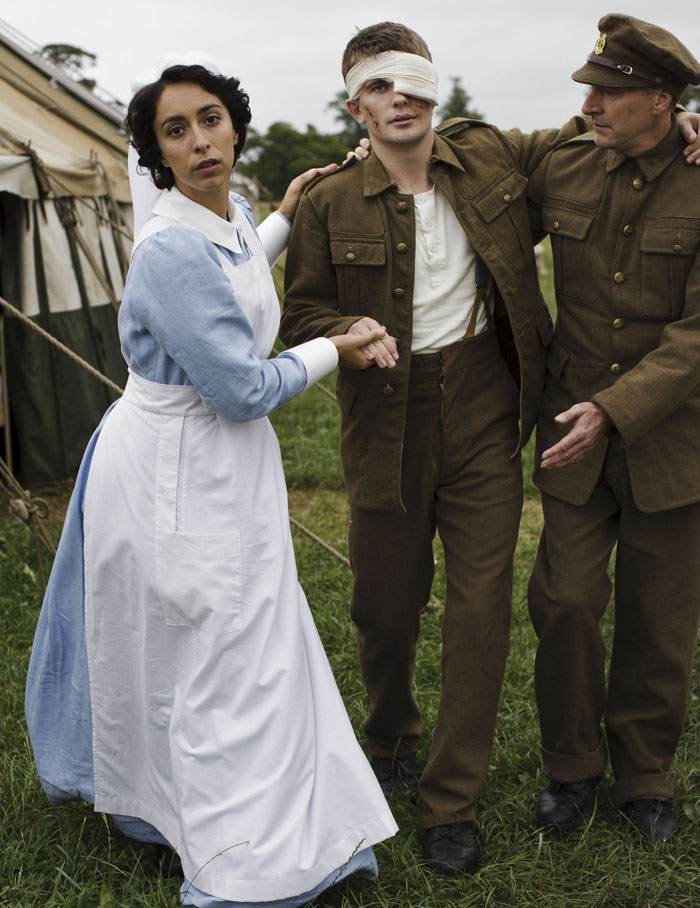 To a certain degree, but let's not kid ourselves that after World War One everything changed for the better. Yes women might have got the vote after the war, but that was a trade-off and that was for women over 30 who owned property so it wasn't a universal thing by any means. After the war the authorities were very keen to re-establish the status quo which had been blown to smithereens, class and gender and everything else (Oona Chaplin as Kitty Trevelyan, pictured above). But I didn't want the series to have a sense of being educative because I thought that would very quickly become niche. I didn't want to do a documentary, I wanted to do a drama. I pitched it to myself as War and Peace meets Breaking Bad. I wanted it to have an epic scope and intimate detail and also for it to be the study of change. I didn't want it be like "look at this extraordinary thing they used to do" - it has to be normal for them, so everything had to be filtered through what it was like to be there in 1915. So much so that when I was doing my reading I would always try and stop short of reading beyond 1915. Everything had to be within the contemporaneous mind frame. You just had to go with what they believed about class, discipline, authority, even the growing fear about the war, the sense that they didn't have the knowledge to meet what this war was doing to the human body and the human mind. Industrial warfare that they'd never seen, they'd never seen these injuries. Medicine and surgery had to make this huge exponential leap. You always start with the characters. The huge narrative is 1914-1918 but beyond that we've got all the characters' lives before, the world they came out of, the backgrounds they come from. They kind of arrived fully formed, it was like people walking into a room and without being introduced you know them.
To a certain degree, but let's not kid ourselves that after World War One everything changed for the better. Yes women might have got the vote after the war, but that was a trade-off and that was for women over 30 who owned property so it wasn't a universal thing by any means. After the war the authorities were very keen to re-establish the status quo which had been blown to smithereens, class and gender and everything else (Oona Chaplin as Kitty Trevelyan, pictured above). But I didn't want the series to have a sense of being educative because I thought that would very quickly become niche. I didn't want to do a documentary, I wanted to do a drama. I pitched it to myself as War and Peace meets Breaking Bad. I wanted it to have an epic scope and intimate detail and also for it to be the study of change. I didn't want it be like "look at this extraordinary thing they used to do" - it has to be normal for them, so everything had to be filtered through what it was like to be there in 1915. So much so that when I was doing my reading I would always try and stop short of reading beyond 1915. Everything had to be within the contemporaneous mind frame. You just had to go with what they believed about class, discipline, authority, even the growing fear about the war, the sense that they didn't have the knowledge to meet what this war was doing to the human body and the human mind. Industrial warfare that they'd never seen, they'd never seen these injuries. Medicine and surgery had to make this huge exponential leap. You always start with the characters. The huge narrative is 1914-1918 but beyond that we've got all the characters' lives before, the world they came out of, the backgrounds they come from. They kind of arrived fully formed, it was like people walking into a room and without being introduced you know them.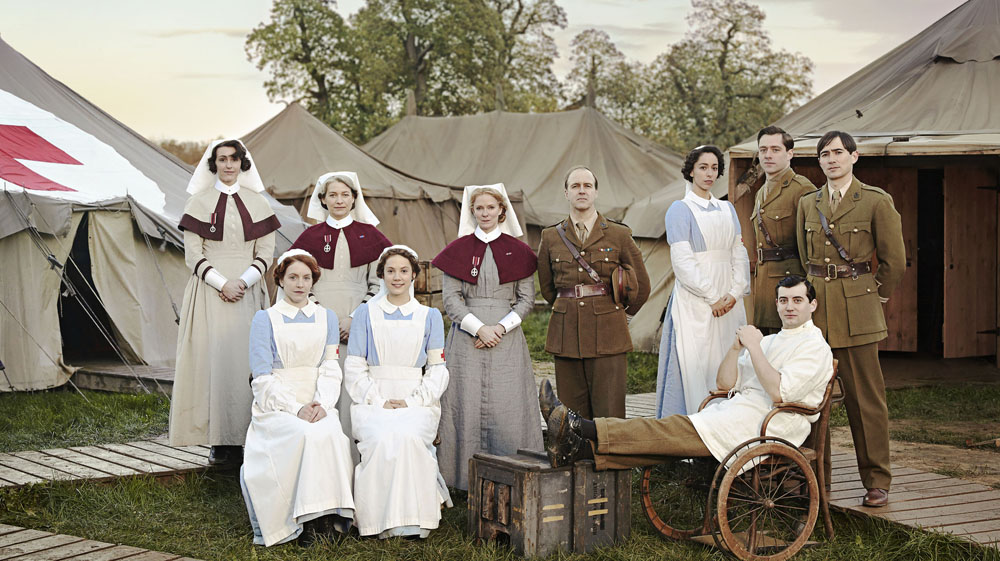
When you worked on EastEnders, were you given a narrative structure that you'd then fill in?
It depends. There's a storyline and obviously there has to be a story document in EastEnders because you're working months ahead and there's a plan, but then you can say "within this episode I think I'll tell the story like this." I always felt I'd got a lot of creative freedom at EastEnders, not to do what I wanted, but to interpret and tell the stories in a way that I found exciting and characterful. Then I'd be storylining myself, I came up with stories and helped to shape them. I'll tell you the absolute truth about being a writer – it's just you and a blank page, and you know this. It's [Hollywood screenwriter] William Goldman isn't it? He said "being a writer's easy, all you've got to do is stare at a blank piece of paper until your forehead bleeds," so the blank page is the same whether its EastEnders or Dickens or whatever.
Did you get much say about the look of The Crimson Field, or the casting?
Yes absolutely. I described the look of the thing in the scripts and I said "look, I get this feeling of life a pioneer town, it makes me think of Deadwood, minus Ian McShane as Al Swearengen," but it did have a pioneer feel about it. The field hospital went up as it was required, and each day it changed and it grew and it mushroomed and it was like the birth of a city, it was like the birth of London. When I went to look at it I thought "bloody hell, you've only gone and done it." Those hospitals would have started off as a couple of ward tents, an operating theatre and an office. By the end of the war they stretched for miles. It gets bigger throughout the series - the first series basically starts in June 1915 and finishes very precisely on October 12 1915. That's when Edith Cavell was executed. I knew I wanted to end the series there because a nurse serving with the British Red Cross in Belgium is found guilty of treason and she's executed by the Germans, I cannot tell you how absolutely shocking this was. The reaction at the time was absolute outrage and horror, as it would be anywhere. I would imagine it probably was so in Germany as well. But one of the things that's really surprising is that between the men at the front, yes there would be terrible acts of cruelty and brutality but a lot of time there was a real sense of camaraderie, like "Jesus Christ we're all in this shit together." You read stories of the most heart-stopping moments of human courage and compassion. Soldiers who'd crawl out to a shellhole under fire to sit with a dying man so he wouldn't die on his own. You saw the absolute worst and the absolute best both at the same time (Kevin Doyle as Lt Col Brett, pictured below).
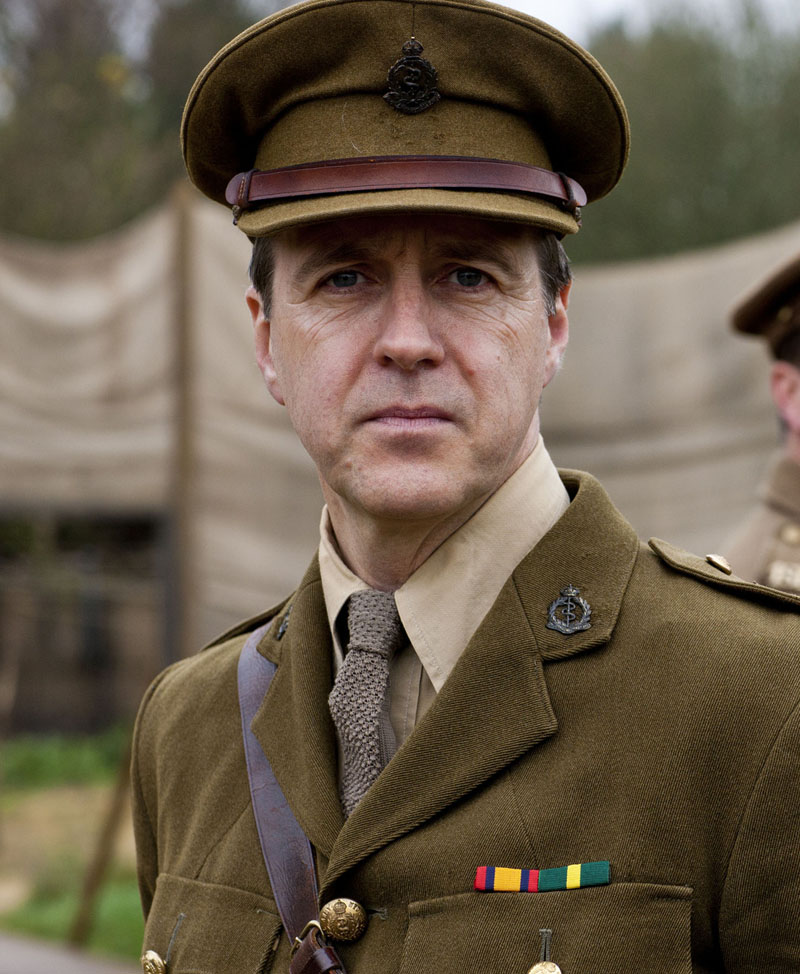 Have we properly come to terms with the trauma of World War One?
Have we properly come to terms with the trauma of World War One?
No I don't think we have at all. When you think about World War Two it's clear who the enemy was, the enemy was fascism and it was a good thing to fight it, but I think it's much harder in the Great War to identify what the bloody hell was going on. I've read battle plans, and you think "who the fuck thought this would be a good idea? To advance at walking pace across open ground when the enemy is in an elevated position and it's broad daylight." You have people making terrible decisions and people making good decisions and it's terribly difficult to characterise it as either one thing or another, it's all things all at the same time all in the same patch of trench. I hope we get another series of Crimson Field, in fact I'd like to get all the way to the Armistice because I've just started. It's really interesting to take a group of people and look at how the war changes them. What it does to them as people, what it did to Britain, what it did to the world and how we are still coming to terms with it.
It must have been very shocking for the young volunteer nurses to come into contact with men in that very exposed and raw way?
Their training was fairly patchwork. Some VADs were trained by incredibly able and very strict nurses and worked on wards and things like that, but reading the accounts of others their training consisted of knitting balaclavas and practising bandaging on each other, and then they were sent out to France. They did make sure they had as much training as possible in dealing with men, but for a lot of these women, generally they had to be over 23 and unmarried. They could have been single or they could have been widowed. For a lot of these girls, this would be their first encounter with men in this state, and the men they'd known would have been fathers and uncles and brothers who were not men broken and in pain or suffering from infectious fever or trauma. And they'd be in intimate situations. If you hadn't got yourself married you were very unlikely to be anything other than a maiden, and suddenly being in those situations would have been a real shock (Suranne Jones as Sister Joan Livesey, pictured below).
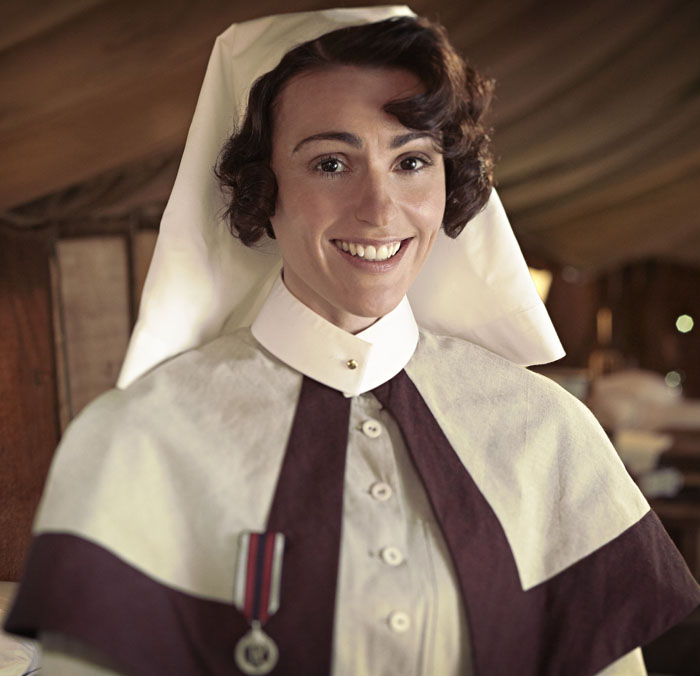 And yet it could also be a liberating experience?
And yet it could also be a liberating experience?
You hear it asked whether this was the beginning of women having careers, but if you were a military nurse, a Queen Alexandra nurse, they'd always had careers. They were in the military, and Grace [Hermione Norris], who's Matron, she's an officer - she won't be called an officer but she is one. Sister Margaret [Kerry Fox] is an officer. They would nurse all over the world, they'd have nursed in the Boer War, Margaret is a veteran of the Boer War. But a military nurse wasn't allowed to marry. A civilian nurse could marry but she wasn't expected to have a career and a husband. Military nurses like Grace and Margaret dedicated themselves utterly to nursing the fighting man with the dedication of a nun - they virtually took vows. They were to be utterly chaste as if they were nuns, untouched. I think the clash for them of suddenly seeing all these volunteer girls, frivolous young things, coming in and permeating this chaste realm of the hospital was a profound shock. And it was a shock to realise that the demands of this war had oustripped their capacity to meet it - this had never happened before. The rug was being pulled from under their feet and it was terribly distressing. This was a world coming to an end. But the volunteers stayed the course. There's a sense of living absolutely intensely because if you're on the edge of the grave, what do you do? Dance or slide in? When we were doing casting, sometimes people would come in with their own little stories. There was a girl who brought in a really old Bible, a little pocket Bible, and it had a hole smashed through it. She said "this was my great-grandfather's and it was in his breast pocket when he went over the top and a bullet hit him and if it hadn't been for his little Bible I wouldn't be here doing this audition." Everybody had a story.
- The Crimson Field begins on BBC One at 9pm on Sunday 6 April
Share this article
Add comment
The future of Arts Journalism
You can stop theartsdesk.com closing!
We urgently need financing to survive. Our fundraising drive has thus far raised £49,000 but we need to reach £100,000 or we will be forced to close. Please contribute here: https://gofund.me/c3f6033d
And if you can forward this information to anyone who might assist, we’d be grateful.

Subscribe to theartsdesk.com
Thank you for continuing to read our work on theartsdesk.com. For unlimited access to every article in its entirety, including our archive of more than 15,000 pieces, we're asking for £5 per month or £40 per year. We feel it's a very good deal, and hope you do too.
To take a subscription now simply click here.
And if you're looking for that extra gift for a friend or family member, why not treat them to a theartsdesk.com gift subscription?
more TV
 I Fought the Law, ITVX review - how an 800-year-old law was challenged and changed
Sheridan Smith's raw performance dominates ITV's new docudrama about injustice
I Fought the Law, ITVX review - how an 800-year-old law was challenged and changed
Sheridan Smith's raw performance dominates ITV's new docudrama about injustice
 The Paper, Sky Max review - a spinoff of the US Office worth waiting 20 years for
Perfectly judged recycling of the original's key elements, with a star turn at its heart
The Paper, Sky Max review - a spinoff of the US Office worth waiting 20 years for
Perfectly judged recycling of the original's key elements, with a star turn at its heart
 The Guest, BBC One review - be careful what you wish for
A terrific Eve Myles stars in addictive Welsh mystery
The Guest, BBC One review - be careful what you wish for
A terrific Eve Myles stars in addictive Welsh mystery
 theartsdesk Q&A: Suranne Jones on 'Hostage', power pants and politics
The star and producer talks about taking on the role of Prime Minister, wearing high heels and living in the public eye
theartsdesk Q&A: Suranne Jones on 'Hostage', power pants and politics
The star and producer talks about taking on the role of Prime Minister, wearing high heels and living in the public eye
 King & Conqueror, BBC One review - not many kicks in 1066
Turgid medieval drama leaves viewers in the dark
King & Conqueror, BBC One review - not many kicks in 1066
Turgid medieval drama leaves viewers in the dark
 Hostage, Netflix review - entente not-too-cordiale
Suranne Jones and Julie Delpy cross swords in confused political drama
Hostage, Netflix review - entente not-too-cordiale
Suranne Jones and Julie Delpy cross swords in confused political drama
 In Flight, Channel 4 review - drugs, thugs and Bulgarian gangsters
Katherine Kelly's flight attendant is battling a sea of troubles
In Flight, Channel 4 review - drugs, thugs and Bulgarian gangsters
Katherine Kelly's flight attendant is battling a sea of troubles
 Alien: Earth, Disney+ review - was this interstellar journey really necessary?
Noah Hawley's lavish sci-fi series brings Ridley Scott's monster back home
Alien: Earth, Disney+ review - was this interstellar journey really necessary?
Noah Hawley's lavish sci-fi series brings Ridley Scott's monster back home
 The Count of Monte Cristo, U&Drama review - silly telly for the silly season
Umpteenth incarnation of the Alexandre Dumas novel is no better than it should be
The Count of Monte Cristo, U&Drama review - silly telly for the silly season
Umpteenth incarnation of the Alexandre Dumas novel is no better than it should be
 The Narrow Road to the Deep North, BBC One review - love, death and hell on the Burma railway
Richard Flanagan's prize-winning novel becomes a gruelling TV series
The Narrow Road to the Deep North, BBC One review - love, death and hell on the Burma railway
Richard Flanagan's prize-winning novel becomes a gruelling TV series
 The Waterfront, Netflix review - fish, drugs and rock'n'roll
Kevin Williamson's Carolinas crime saga makes addictive viewing
The Waterfront, Netflix review - fish, drugs and rock'n'roll
Kevin Williamson's Carolinas crime saga makes addictive viewing
 theartsdesk Q&A: writer and actor Mark Gatiss on 'Bookish'
The multi-talented performer ponders storytelling, crime and retiring to run a bookshop
theartsdesk Q&A: writer and actor Mark Gatiss on 'Bookish'
The multi-talented performer ponders storytelling, crime and retiring to run a bookshop

Comments
I was the original historical